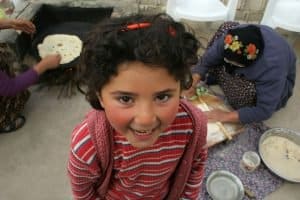
“Without education, a generation of children in Greece will be lost, without necessary skills to contribute to their countries and economies and at greater risk of exclusion. Getting children whose lives have been on hold back into school will help them communicate and socialize with Greek children and help them rebuild their futures,” says Laurent Chapuis, the country coordinator for UNICEF’s refugee and migrant response in Greece. “It is not only crucial for the mental health and psychosocial well-being of refugee and migrant children, it will reactivate their development and bring back a sense of stability in their unsettled lives.”
“We applaud the generous plan and tireless efforts made by the Greek government to welcome refugee and migrant children in school,” says Sofia Tzitzikou, the president of the Hellenic National Committee for UNICEF. The Ministry of Education is committed to opening the doors of its public schools to as many refugee and migrant children as possible, by establishing reception classes for children residing in temporary sites as well as those living in urban accommodation.
“The inclusion of refugee and migrant children in Greek schools has only positive aspects as Greek children—not only will they learn in a multicultural, peaceful, and caring environment, all these children will also be fully vaccinated before they enroll in school just in the same way as Greek children,” says Tzitzikou. “The Ministry of Education and the Ministry of Health are working closely together to guarantee mandatory vaccination and preventative health examinations will take place before the start of reception classes. Once enrolled, refugee and migrant children will be given intensive Greek language support to accelerate their language acquisition.”
Some refugee children have missed up to two and a half years of schooling during their journeys, and less than a third of the 12,000 children of school age have had access to formal education. Language barriers and capacity within the system, stress and trauma leading to poor concentration and high drop-out rates, and resistance to learning Greek as many hope to continue their journeys to other parts of Europe are among the factors that have kept children out of school.





